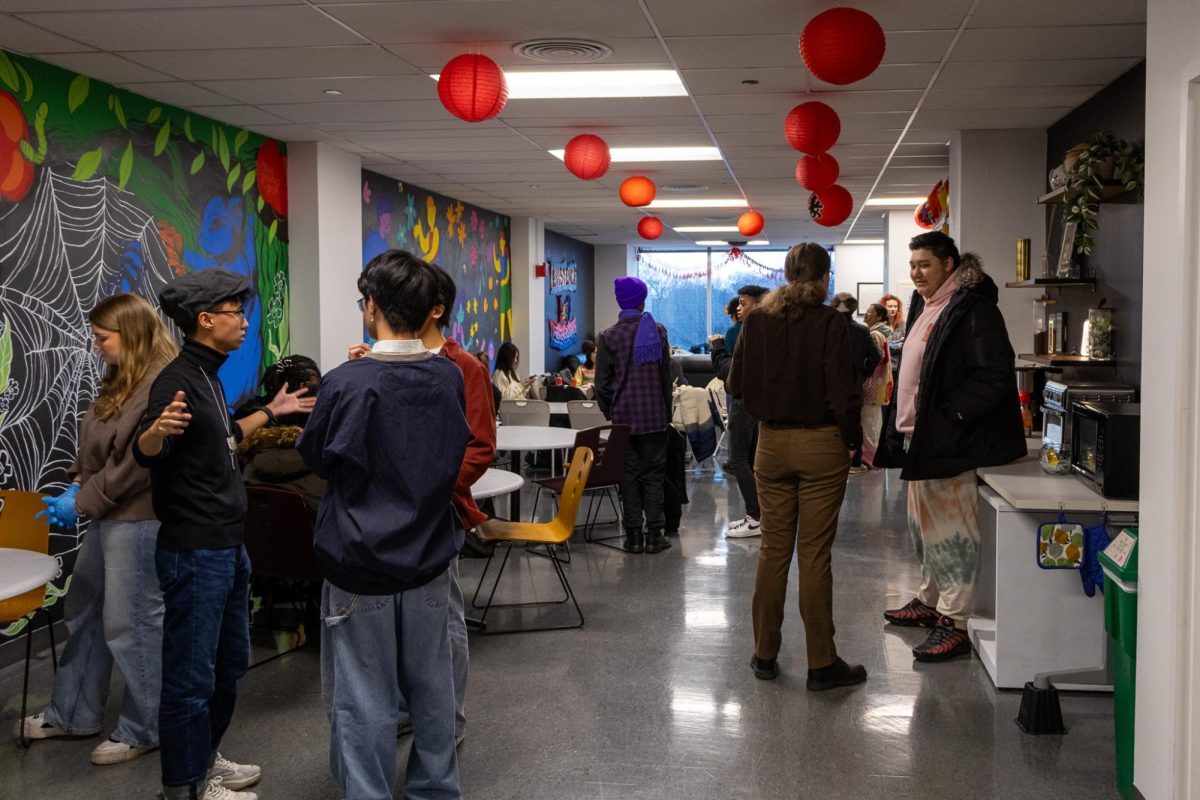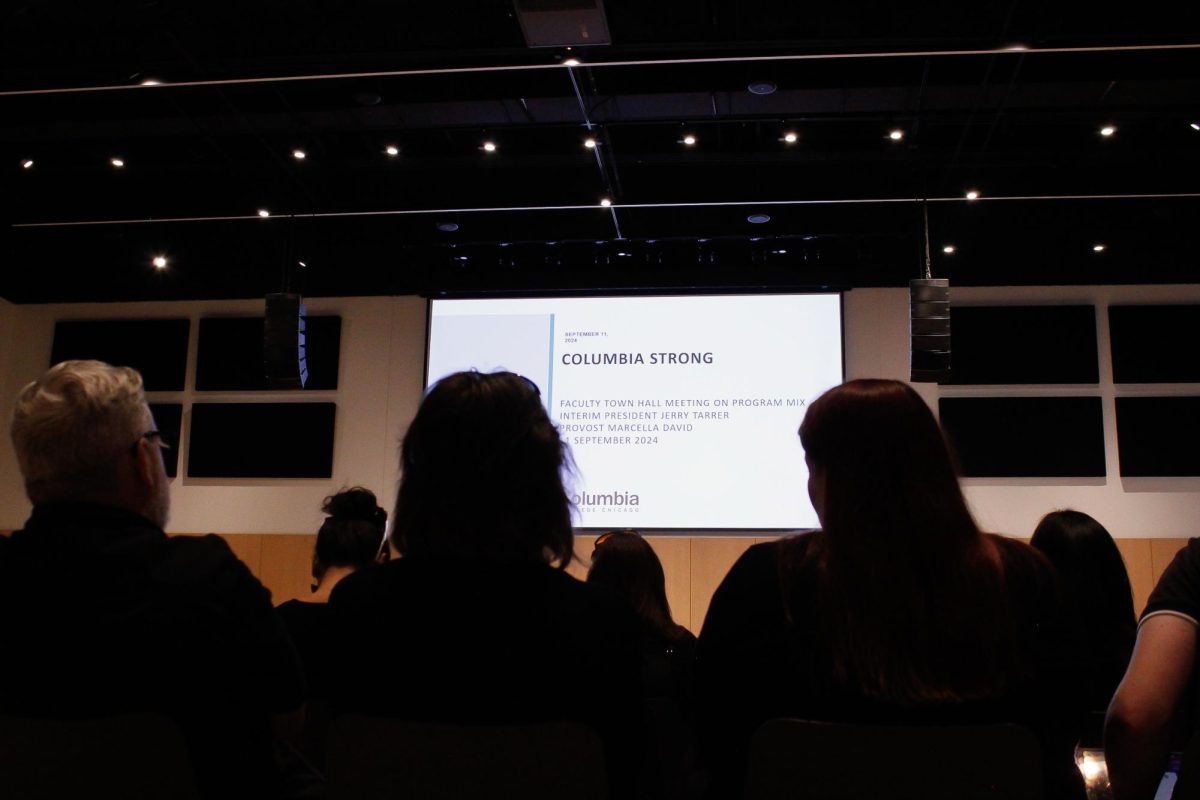President and CEO Kwang-Wu Kim is recommending that the college reduce its core general education requirements to 30 credits starting in Fall 2024, which would result in the possible elimination of 11 to 13 full-time faculty positions across the English and Creative Writing, Humanities, History & Social Sciences, and the Science and Mathematics departments.
In his draft Presidential Advisory Report shared in an email with the campus community on Wednesday, Feb. 28, Kim also proposed restructuring the college’s schools. Currently, there are four schools headed by deans: Graduate Studies, Liberal Arts and Sciences, Media Arts and Fine and Performing Arts. Under his proposal, the college would be divided into eight schools, or “creative entities,” headed by directors.
This would reduce approximately 50% of the current number of academic administrators with the titles of dean, associate dean and department chair. Those currently in those roles would return to faculty status, Kim said in the report.
Sale of real estate
Kim, who announced he will resign on July 1, also proposed to sell the president’s house, located in Chicago’s Gold Coast neighborhood, and the library building located at 624 S. Michigan Ave.
Majors selected as “programs of concern”
His draft report also identified 28 degrees as “programs of concern” that he said could be eliminated, revised or combined with other programs. They include bachelor’s degrees in ASL interpretation, communication and music and bachelor’s of fine arts degrees in computer animation, fashion design and musical theatre performance. Some programs that have both bachelor’s and bachelor’s of fine arts degrees are on the list, including film and television, dance and photography.
Being on the list doesn’t mean the college is necessarily ending the major; rather the programs are targeted for “special planning focus” based on issues identified with graduation and retention rates, enrollment and in a few cases, complexity, as is the case with the film and televisions bachelor’s and bachelor’s of fine arts degrees.
Even when the college eliminated programs in 2017, it only stopped admitting new students and continued to teach the current students through graduation.
Kim’s report said the college will remain in “adverse circumstances,” a process outlined in the Statement of Policy until the $38 million deficit is eliminated. That declaration allows the college to eliminate academic programs and lay off tenured or tenure-track full-time faculty.
The Faculty Senate will now review and provide feedback on the recommendations by April 10. Kim then will present his final recommendations to the board on May 2.
Although Kim said earlier that he would ask his vice presidents to identify possible cuts in their units, up to a third of their budgets, the draft advisory report offered no specific details about administrative cuts beyond the elimination of the academic leader positions, stating only that the college plans to cut $18.8 million across departments from the fiscal year budget which begins on Sept. 1. Of that amount, $15 million will come from “administrative efficiencies and reorganization,” and $3.8 million will come from eliminating 304 class sections across the Fall 2024 and Spring 2025 semester.
Reduction of Columbia Core credit requirements
As he hinted earlier, Kim proposed that total core requirements will be reduced from 42 to 30, allowing students to take more classes in their major. Through the president’s “reimagined school structure” the college would eliminate all of the schools and the current dean positions, replacing them with a dean of academic programming and faculty affairs. These academic leaders would remain in the departments and still be required to teach.
Any course changes would be reflected in the 2024-25 catalog and apply to incoming Fall 2024 first-year students. Continuing students would have the option of taking advantage of the core changes.
Increased course load for tenure and tenure-track faculty
The proposal anticipates an adjustment in the number of full-time faculty required to teach the revised core.
There are currently 73 faculty in the English and Creative Writing, Humanities, History & Social Sciences and Science and Mathematics Departments, according to the report, and “we would expect that major requirements and new Core requirements could be delivered with 60 to 62 faculty, depending on expertise.”
Some faculty, both full-time and part-time, will no longer be able to teach core courses based on the new philosophy and criteria, the report stated. “While several tenured faculty in these departments are currently on phased retirements, additional action may be needed to adapt full-time faculty staffing levels to the revised core requirements, resulting in the departure of full-time faculty – both tenured and non-tenured – beyond phased retirements.”
Additionally, the workload for tenure and tenure-track faculty will change. Full-time faculty who currently teach nine credits each semester will be asked to teach an additional three credits per year.
Declining student enrollment
Since 2019, overall enrollment has fallen from 6,947 in Fall 2019 to 6,529 students in Fall 2023. This spring, the enrollment went down another 12%, to 5,757. The college is expecting enrollment to drop again by 1,000 students in Fall 2024.
Enrollment decreased even as the college has offered more financial aid and scholarships, the Chronicle previously reported. Meaning, the college doesn’t have the revenue needed to support its operating costs. By Fall 2024, Columbia will have raised tuition and fees by a total of 20% over three fiscal years.
John Holmes, chair to Columbia’s Board of Trustees, said “time is of the essence” to close the financial gap.
“We’re just in a period of uncertainty, and uncertainty is fueling a lot of that anxiety,” Holmes said in an exclusive interview with the Chronicle on Monday, Feb. 26. “Once the plan comes out, my hope is that everyone will look at it and say, ‘Wow, this makes a lot of sense.’”
He added that the process of deciding curriculum and possible restructuring changes of the college is a “conversation” with all stakeholders.
Columbia has been in planned deficit spending since 2020, which was partly fueled by the pandemic and exacerbated by the part-time faculty union strike last fall. At the start of the Fall 2023 semester, the college’s deficit spending was sitting just under $20 million. As the Spring 2024 semester started, Kim announced the deficit had grown to $38 million, with $13 million in one-time costs from the strike.
“I can’t think of a more important time for the college to be in a collaborative and dialogic problem-solving mode,” said Faculty Senate President Madhurima Chakraborty, in an email to the Chronicle before the report was released. “There are no productive solutions for the college’s success – long term or short term, that don’t depend on the faculty to deliver a significant, meaningful and quality education to our students.”
Joan Giroux, president of Columbia’s American Association of University Professors chapter and professor in the Art|Art History Department said the report will “shape Columbia’s future, and define the college’s values for years to come.”
“I hope that the college remains true to inclusion and collaboration, and keeping the quality of our students’ education as its guiding principle,” Giroux said in an email.
Columbia’s AAUP Advocacy Chapter will provide opportunities for faculty to voice their concerns, informing how faculty will actively engage in response to the report, she added.
Resumen en Español:
El presidente y director ejecutivo, Kwang-Wu Kim, recomienda que la universidad reduzca sus requisitos básicos de educación general a 30 créditos, a partir del otoño de 2024, lo que resultaría en el posible despido de 11 a 13 profesores de tiempo completo en los departamentos de Inglés y Escritura Creativa, Humanidades, Historia y Ciencias Sociales y Ciencias y Matemáticas.
En su borrador de Informe de Asesoría Presidencial, compartido en un correo electrónico con la comunidad del campus el miércoles 28 de febrero, Kim también propuso reestructurar las escuelas de la universidad. Actualmente, hay cuatro escuelas dirigidas por decanos: Estudios de Posgrado, Artes Liberales y Ciencias, Artes Mediáticas y Bellas Artes y Artes Escénicas. Según su propuesta, la universidad se dividiría en ocho escuelas, o “entidades creativas”, encabezadas por directores.
Su informe preliminar también identificó 28 programas como “programas de preocupación” que, según dijo, podrían eliminarse, revisarse o combinarse con otros programas.
El informe de Kim dijo que la universidad permanecerá en “circunstancias adversas”, un proceso descrito en la Declaración de Política hasta que se elimine el déficit de 38 millones de dólares. Esa declaración permite a la universidad eliminar programas académicos y despedir a profesores titulares o en vías de permanencia a tiempo completo.
Kim, quien anunció que renunciará el 1 de julio, también propuso vender la casa del presidente, ubicada en Gold Coast, y el edificio de la biblioteca en 624 S. Michigan Ave.


















